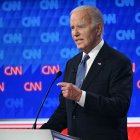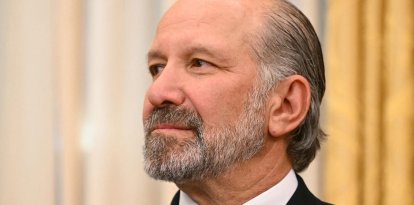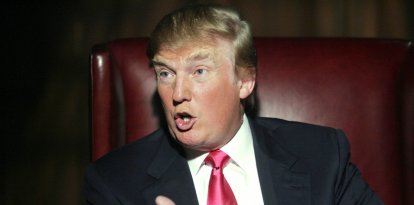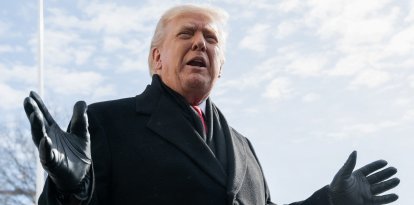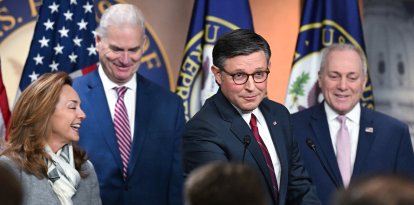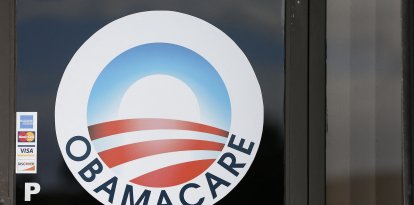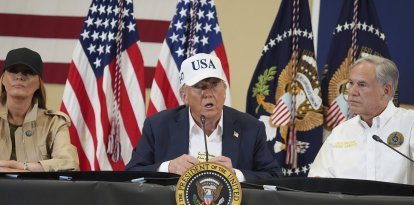Democrats push to remove Biden after debate failure, but replacing him against his will would be "nearly impossible"
People such as Van Jones from CNN and Nicholas Kristof from The New York Times have publicly called for the current president to step down. However, this process seems complex to say the least.

Joe Biden
Joe Biden came out of the first presidential debate against Donald Trump weaker than ever. According to early polls, seven out of ten viewers believe Trump came out the winner. Democrats are seriously concerned about the image the president left on the CNN stage in Atlanta.
For these reasons, even minutes before the end of the debate, prominent Democratic media figures began to discuss the possibility of the current Commander-in-Chief stepping aside and declining his candidacy, of course with the aim of avoiding a greater evil in November. They even revealed off-the-record conversations held with party leaders, many of whom would be happy to support an alternative candidate.
">I wish Biden would reflect on this debate performance and then announce his decision to withdraw from the race, throwing the choice of Democratic nominee to the convention. Someone like @gretchenwhitmer or @SherrodBrown or @SecRaimondo could still jump in and beat Trump.
— Nicholas Kristof (@NickKristof) June 28, 2024
CNN's Van Jones and historical columnist for The New York Times, Nicholas Kristof spoke out publicly on the matter, practically begging Biden to step aside.
However, the president already has enough pledged delegates to be the Democratic nominee, which could lead to big problems should he not step down voluntarily.
Could the Democrats remove Biden against his will?
As in every democratic primary process within the Democratic Party, i.e., those from 1970 onward, individual states choose the candidate of their choice by sending a certain number of delegates to the convention to vote for their candidate of choice.
In other words, if Biden got 160 delegates in California, these people would have no choice but to vote for him on the day of the convention, which will be held in early August in Chicago.
However, delegates to the Democratic National Convention are not "bound" to their candidate. Under the current rules, and sticking to the literal wording, they have some leeway.
According to the rules of the Democratic National Convention, "Delegates elected to the national convention who have pledged themselves to a presidential candidate shall in good conscience reflect the sentiments of those who elected them.”
With all states having already held their presidential primaries, Biden has an estimated 3,800 pledged delegates, far more than he needs to secure the nomination.
Therefore, in order to remove Biden against his will, the delegates would have to come together, which is unprecedented and seems highly unlikely, even more so considering that the current DNC chairman, Jaime Harrison, is a long-time ally of the president.
Should they want to change the rules to make Biden's removal easier, the DNC members would have to meet before the convention and modify the functioning of the convention.
Moreover, in the last several decades, no party has attempted to remove the nominee arbitrarily, so it would set a historic precedent.
What if Biden steps down before the convention?
That would be a completely different scenario and surely much friendlier for all parties. If a week before the convention the president publicly declined his candidacy, similar to Lyndon Johnson in 1968, this part of the problem would be resolved and Biden would no longer be the Democratic nominee.
Of course, this option raises another question: Who would replace Biden?Although Kamala Harris is the presumptive vice presidential nominee, she would not have any privileges, so she would have to compete for a majority of the 4,000 Democratic delegates.
">🚨CNN’S VAN JONES CALLS FOR BIDEN TO PULL OUT OF RACE:
— Benny Johnson (@bennyjohnson) June 28, 2024
“There are going to be a lot of people who want him to consider taking a different course now… That was not what we needed from Joe Biden. It is personally PAINFUL for a lot of people.” pic.twitter.com/IgcnwZhCbS
This possibility would open the door to many Democrats who considered running but did not jump in out of respect for Biden's presidential campaign. These include Gavin Newsom, Gretchen Whitmer and JB Pritzker, among many others. Although also unlikely, some analysts presented Pennsylvania Governor Josh Shapiro as one of the strongest contenders against Trump.
However, all discussions would come to an end if Michelle Obama were to join the race, something that has been widely speculated about in recent months.
In the event that the president were to step down at the convention, the process would be the same. It would trigger an open convention with all potential candidates fighting each other for delegates.
Could Biden withdraw after the convention?
In the latter case, the president would leave room on the Democratic national ticket.
To fill that void, Biden would have to call a "special meeting" of the full Democratic National Committee, which includes about 500 members. Although it does not sound very bureaucratic, those present would have to vote and elect by majority vote the new nominees for president and vice president.
This option also presents another problem. The ballots are printed well in advance of the election, so it may not be possible to change them in time, opening the door to constitutional and logistical issues.






